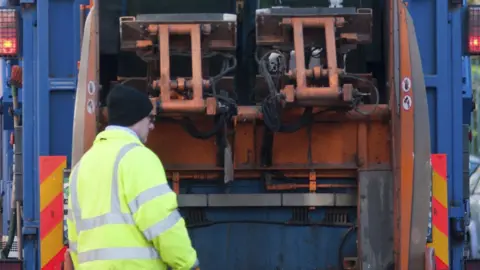Councils in England say funding boost next year won't be enough
 Getty Images
Getty ImagesCouncils in England are warning they will struggle to balance their budgets next year, despite a rise in funding.
The government has announced they will have £64bn to spend next year, assuming they all hike council tax by the maximum amount.
Ministers argue this represents a 6.5% rise on this year and will account for rises in inflation.
But councils have warned they will still need to make cuts next year to cover rising costs.
Authorities also say they are struggling to cope with rising demand for services they legally have to provide, such as social care.
Since 2020, seven councils have declared themselves effectively bankrupt after they were unable to balance their budgets, including three this year.
The provisional figures cover spending from April next year, and will now be consulted on before being finalised in February.
It includes an additional £2bn compared to this year, including £1bn for social care, which the government says will make an extra £3.9bn available, once assumed council tax rises are taken into account.
The government said this would be 6.5% more than the equivalent figure for this year, which it argued represented an "above inflation increase".
It added that this was because it is more than the 1.7% predicted inflation in the economy for next year, known as the GDP deflator, as calculated by official forecasters.
However, the Local Government Association, which represents councils in England and Wales, said the settlement would not be enough to help authorities cope with "severe cost and demand pressures".
Its chair, Cllr Shaun Davies, said it would leave councils with a £2bn funding gap over the next two years and leave services "exposed to further cuts".
'Double whammy'
Cllr Barry Lewis, finance spokesperson for the County Councils Network, said the larger, more rural authorities the group represents would find the allocation "bitterly disappointing".
He added that councils would "have no choice" but to raise council tax and reduce services - which he called a "double whammy" for residents.
The government also confirmed that Thurrock, Slough and Woking - three of the councils that have effectively gone bust in recent years - will be able to raise council tax by more than the usual 5% next year without holding a local vote.
But it said the 5% maximum for councils providing social care services would stay in place elsewhere, to protect people from "excessive tax rises".
'Sticking plaster'
After a period of austerity which saw budgets cut, the government has increased the funding available to councils, including for this year and next.
But a combination of inflation and growing demand for services, particularly support for vulnerable adults and children, and housing services, has left many councils facing budget shortfalls.
Councils also say they will remain exposed to high rates of inflation this year for some time, since they will have determined the cost of a number of contracts that will continue into next year.
Local Government Secretary Michael Gove told MPs earlier this month that all of the councils to declare effective bankruptcy so far have shown a "direct linkage" with poor leadership.
But he acknowledged: "It may be the case in the future that some local authorities that have been relatively well managed will face particularly acute pressures".
Labour accused the government of a "reckless" approach to local council funding, calling the settlement a "prime example of sticking plaster politics".
Shadow local government minister Jim McMahon said his party would help authorities "foster local growth" and would also introduce longer funding settlements.
